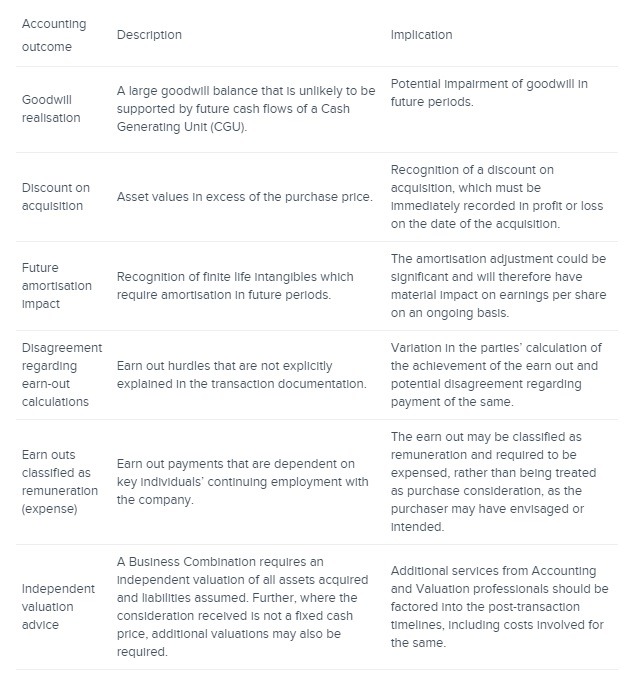Selected post-transaction Valuation and Accounting factors
 Findex Corporate Finance – Valuations Partner Nicole Vignaroli and IFRS Technical Specialist Christine Webb discuss selected post-transaction Valuation and Accounting considerations and ask: Was a transaction really completed, or not?
Findex Corporate Finance – Valuations Partner Nicole Vignaroli and IFRS Technical Specialist Christine Webb discuss selected post-transaction Valuation and Accounting considerations and ask: Was a transaction really completed, or not? 
To hear more about business issues from Findex Australia, National Tax Director Roelof van der Merwe will chair the Latest Tax Updates session at the 5th Annual Small Business Tax Essentials Conference on Thursday, 30 May.
A successful transaction takes an immense amount of time, effort and skills. The expertise of several advisers and stakeholders are required to collaborate effectively to ensure an optimal outcome from each perspective. Transactions typically have a long duration and when the ‘ink is finally dry’ on the contracts, transaction fatigue is not uncommon for all parties involved.
However, following the completion of any transaction, the next step is to embark on the integration journey. Further, any transaction classified as a Business Combination (in accordance with AASB 3) also involves determining the accounting and valuation implications.
Accounting for a transaction via a Purchase Price Allocation can result in some unexpected practical and financial statement outcomes that should not be underestimated. If possible, these implications should be considered prior to completion of transaction terms. We explore a number of these potential outcomes and their implications below.

As highlighted above, there are many important considerations that must be noted during the transaction process. The list above highlights a selected few interesting outcomes and is not exhaustive. The potential outcomes and their flow-on ramifications should not be underestimated. Accordingly, deal-makers (companies and their advisers) should inform themselves of the potential accounting application of any transaction and seek the expert guidance from experienced Valuation and Accounting advisers.
Nicole Vignaroli is a Partner of Findex and the leader of the Melbourne Corporate Finance Valuations team. Nicole is an astute adviser, providing specialist Corporate Finance advice, focussing on valuations of equity, shares, businesses and intangible assets, discount rate assessments, purchase price allocation, impairment reviews, modelling and commercial impact evaluation. Nicole has also conducted numerous technical presentations and authored a number of articles on valuation methodology and approaches, issues in valuations, purchase price allocation and the valuation of goodwill and intangible assets. Nicole possesses financial accounting, business modelling and business valuation expertise to deliver high quality solutions to individuals, management, companies and legal and tax advisers. Nicole has been involved in the valuation of small to medium businesses; valuation of entities including private companies; partnerships and trusts; listed corporations; the valuation of intangible assets including goodwill, brand names, contracts, customer relationships, software and other intellectual property; and the valuation of projects at various stages of development. Connect with Nicole via LinkedIn ![]() .
.
Christine Webb is IFRS Technical Manager at Findex Australia. Christine specialises in providing accounting technical advice to clients at a national level. Her national role focuses on the interpretation and application of Accounting Standards and the Corporations Act 2001 which requires advising clients, partners and staff on accounting issues and reviewing and assisting with financial statement disclosures. Connect with Christine via LinkedIn ![]() .
.
You can also connect with Findex via LinkedIn ![]() or Facebook
or Facebook ![]() .
.